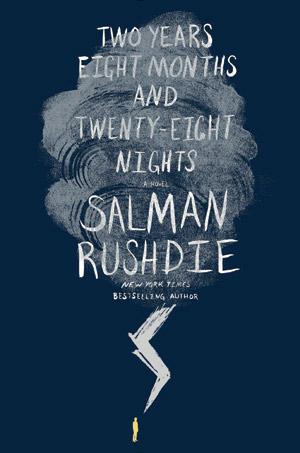A good book is one you recognise instantly. It’s alive. It grabs you from the first page and swirls you around, making you meet familiar people and showing you secrets about yourself that you may not have wanted to admit. A good book makes you feel euphoric.

A good book is one you recognise instantly. It’s alive. It grabs you from the first page and swirls you around, making you meet familiar people and showing you secrets about yourself that you may not have wanted to admit. A good book makes you feel euphoric. There are lines you want to read again because it’s been said better than you could have said it. There are paragraphs you want to share with a beloved. Rushdie’s Two Years Eight Months and Twenty-Eight Nights gets your heart to soar.

Salman Rushdie (L) receives Denmark's top literary award, the Hans Christian Andersen Literature Award, handed by Danish Crown Princess Mary (R) in August 2014, near Copenhagen. PIC/AFP
The book traverses an ancient land where Jinns crossed in and out, a hundred years ago. It tells of philosopher Ibn Rushd who is out of favour and of a jinnai, the Lightning Princess from the land of Jinns.

Two Years Eight Months and Twenty Eight Nights, Salman Rushdie, HH Penguin, R599
The main plot — the outermost story that loops the other stories within more stories — is about a philosophical feud between rationalist Ibn Rushd and pious theologian Ghazali of Iran who says, God decides. Period. Ibn Rushd who tries to resolve reason and humane morality with God and faith is exiled. In exile, he meets a female jinn who, enamoured by humans is on earth
for adventure.
One day, she murmured to the absent philosopher, one day long after you are dead, you will reach the moment at which you will claim your family, and at the moment, I, your spirit wife, will grant your wish, even though you have broken your heart.
Of the many male protagonists, Geronimo, a gardener, stands out. Ear lobe-less, tall and one who chose gardening above all professions, he is patiently carved out for the reader. One day when a storm strikes New York City, Geronimo walks to the garden he is working in and weeps. His work has been destroyed with disdain and… his feet don't touch the ground. There are many female protagonists, but we’ll talk of Dunia, female jinn, the proliferator of humanlings, and the reason why her multitudes of half jinn babies, people with lobes-less are everywhere. She blew them out of her like bubbles and they frothed over and settled wherever the wind dropped. Rushdie paints a modern-day One Thousand and One Nights, spewing one story after another, each one connected by a thread to the first.
There was a petrol shortage but he had hoarded his own supply and reckoned he would be able to cope. Mr Geronimo was a hoarderer of fuel, gas masks, torches, blankets, medical supplies, tinned food, water in lightweight packets; a man who expected emergencies, who counted on the fabric of society to tear and disintegrate, who knew that superglue could be used to hold cut together, who did not trust human nature to build solidly or well. A man who expected the worst. Also a superstitious man, crosser of fingers, who knew, for example that in America wicked spirits lived in trees so it was necessary to knock of wood to drive them out, whereas British tree-spirits (he was an admirer of British countryside) were friendly creatures so one touched wood to get the benefit of their benevolence. These things were important to know. One couldn’t be too careful. If you walk away from God you should probably try to stay in the good books of Luck.
A magnificent play of words and stories. A master storyteller he is, this Rushdie.
 Subscribe today by clicking the link and stay updated with the latest news!" Click here!
Subscribe today by clicking the link and stay updated with the latest news!" Click here!









